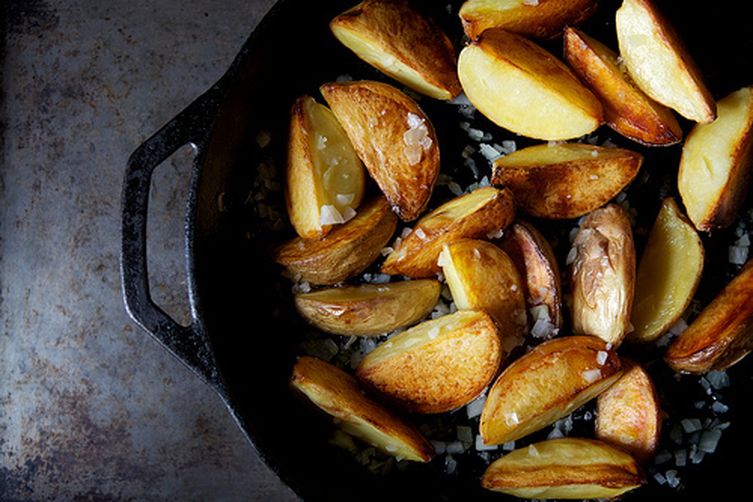Author Notes: These potatoes have evolved.
Dubbed “World Famous Potatoes” by my daughter (as in, “will you be bringing the world famous potatoes to Hannah’s house?”), their initial incarnation was granted me by my former hairdresser. John, of Greek Orthodox extraction, and I used to compare our Easter and Passover menus as I was deftly shorn and styled. He taught me the secrets of Avgolimono soup, though I have yet to take that plunge. The idea for this recipe came from him. I’m not even sure whether his instructions called for initial boiling or roasting; the Yukon Golds were my first alteration. I only remember the lemon and onions, and the directive to “use more salt than you think you’ll need”, intoned with an air of quiet authority. I went home and roasted, with good results. Over time, minor errors stacked up and made what to me was an even better potato: a wedge, accidentally flipped upside down, produced a crisper crust. I lost track of time and overcooked them. Some recipes are more about guidelines than about measurements. This is one of those recipes. You can make more or less to suit your taste, you can use more or less onions. But they should be pretty tangy with lemon juice and salt, which rounds out the flavor. —creamtea
Food52 Review: This is one of those “you gotta have faith” dishes — yes, the potatoes will eventually turn mahogany; yes, contact with the hot potatoes will cook the onions just enough so that they lose their rawness but retain a nice bite; yes, you won’t regret using a generous handful of salt. Be sure to allow yourself several hours’ cooking time, throw in whatever fresh herbs you have on hand, and don’t hesitate to pull the potatoes before they’re truly mahogany if dinnertime is fast approaching and you’re satisfied with their heft and flavor. – Kukharka —mitschlag
Serves: variable; 5 lbs. of potatoes serves 8 -12
Prep time: 20 min
Cook time: 1 hrs 10 min
Ingredients
-
5
pounds small to medium Yukon Gold potatoes
-
1
splash Olive oil
-
3
tablespoons Juice from about 1 to 1 1/2 lemons, strained
-
1
onions (up to 2, depending on size), diced small (1 very large, 2 to 3 smallish onions, regular or sweet vidalia-type
-
1
pinch Sea salt, more to taste
Directions
- Preheat the oven to 375° F. Wash the potatoes and cut into wedges from pole to pole (cut in half and half again, but do not peel)
- Pour a generous swirl of oil into each of several roasting pans. Tilt to coat the bottoms thoroughly with the oil. You will need a goodly amount because they tend to stick. I use 2 pans plus a heavy 12-inch cast iron skillet for 5 pounds of potatoes. The skillet cooks fastest and makes the very best brown crust.
- One by one, put the potato quarters cut side down in the pans. Rotate each wedge around its pole so all sides are coated with the oil (or rub onto all sides). End with the cut sides down-important. Place them in neat rows; you can fit a few more by angling each row of wedges first one way, then the other, herringbone-style.
- Place the pans in the oven and roast. Do not turn the wedges nor shake the pan. Leave them alone. Roasting time is dependent on your pans. You want a really good deep brown color on the cut edges that are in contact with the pan, at least for many of the wedges. Don’t just stop at tan. (Okay, several will be tan; some should go mahogany). Start checking after an hour, according to your oven. This may take awhile.
- While the potatoes are roasting, dice the onions.
- As soon as you take the potatoes out of the oven, blanket them with the onions, the juice and a good amount of salt, scrape them from the bottom of the pan and toss everything together. This may have to occur in stages as each pan finishes cooking. If you use cast iron, you may want to remove the potatoes to a large bowl first to avoid getting acid on the pan. The retained heat of the potatoes will start to cook the onions. Taste for seasoning. Turn into a serving bowl. Serve hot, warm, or at room temperature. Still good the next day.

